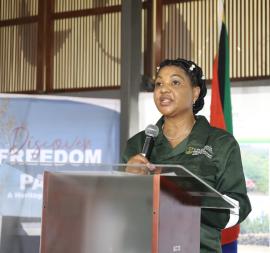
By Bernice Swarts
As the world battles escalating environmental challenges, from climate change to biodiversity loss, one crisis continues to be overshadowed – that is land degradation. Every year, over 100 million hectares of productive land are lost or degraded, affecting the lives of more than 1.3 billion people globally.
In regions already grappling with poverty, hunger, and unemployment, this environmental degradation becomes a multiplier of vulnerability.
The recent Global Land Degradation Neutrality – Integrated Land Use Planning (LDN–ILUP) Inception Workshop that took place in Sandton, South Africa marked a critical turning point in the global fight against Desertification, Land Degradation, and Drought (DLDD). For four days, experts, government representatives, and development partners from 18 participating countries gathered to refine targets and develop strategies aimed at restoring our planet’s productive land. This meeting was not just another technical gathering - it was a platform of hope for millions whose lives and livelihoods depend on healthy land.
At the heart of this initiative is the principle of Land Degradation Neutrality (LDN), a concept rooted in sustainability and inclusivity. It recognises that land restoration cannot succeed without the active participation of people at the grassroots level. These are the farmers, herders, and communities whose daily decisions directly influence land and water resources. Empowering them to implement sustainable practices remains vital.
Bringing the issue of land degradation home to our country, it must be noted that South Africa, is currently presiding over the G20 under the theme: "Solidarity, Equality and Sustainability.” Our country will use its presidency of the G20 to place the issues of DLDD at the heart of G20 member states and tackle degradation in the country. Our argument is that the G20 - representing the world’s largest economies - must lead by example in addressing land degradation as an integral part of climate and development discourse.
The G20 Environment and Climate Sustainability Working Group (ECSWG) – which is led by our department – will focus on DLDD, along with other critical areas such as biodiversity, climate change, and ocean health. But while global policy alignment is essential, real progress lies in concrete actions on the ground—large-scale restoration projects, transboundary collaboration, and integration of Sustainable Land Management (SLM) into national development plans.
To this end, existing initiatives such as the Changwon Initiative, African Forest Landscape Restoration Initiative (AFR100), the Great Green Wall, and the United Nations Decade on Ecosystem Restoration must be harnessed and scaled up. These programmes provide tested frameworks for land restoration and resilience building.
However, none of these ambitions will materialise without adequate and sustained financial support. Development and financial partners must step up their efforts. While we acknowledge the critical support provided by entities like the Global Mechanism of the UNCCD, Global Environment Facility, and development partners from Canada and Germany, there remains a significant financing gap. Innovation in resource mobilisation is urgently needed, whether through blended finance, public-private partnerships, or carbon markets. South Africa will therefore call on the developed nations under the G20 to provide more financial support to developed countries to tackle land degradation.
It must also be noted that we cannot continue to formulate frameworks and strategies without addressing the daily realities faced by vulnerable communities. If we are serious about achieving the targets of the UNCCD, Convention on Biological Diversity, and the Paris Agreement, financial commitments must match the scale of ambition.
I must commend all dignitaries from all over the world who attended the workshop. I want to reiterate that the workshop should not be seen as a standalone event. It must be viewed as a launchpad for action—an opportunity to demonstrate that LDN is not merely a technical term, but a vehicle for change, resilience, and hope. As global citizens, we owe it to future generations to restore the land they will inherit.
Let this be the moment we stop talking and start restoring.
*Bernice Swarts is the Deputy Minister of Forestry, Fisheries and the Environment


